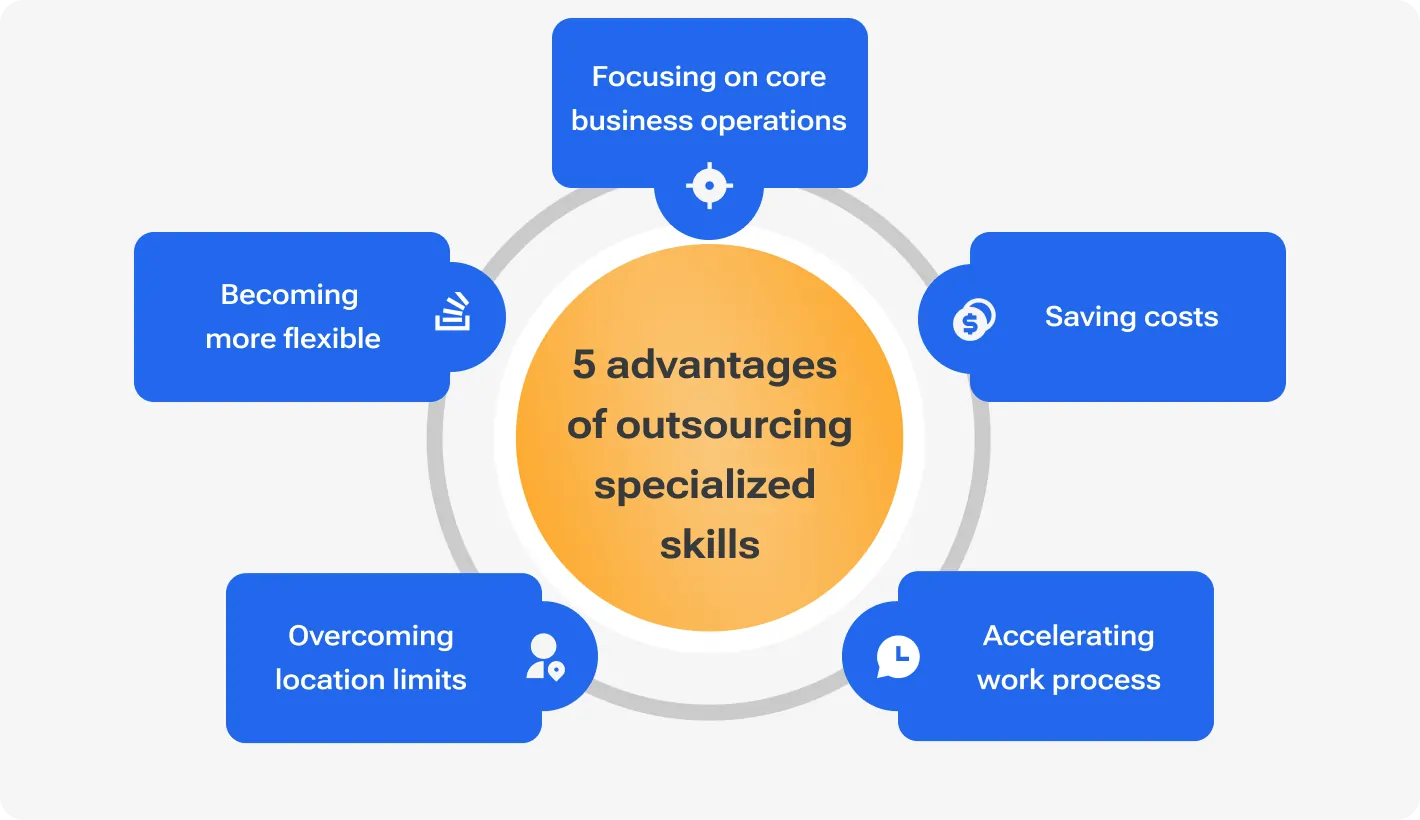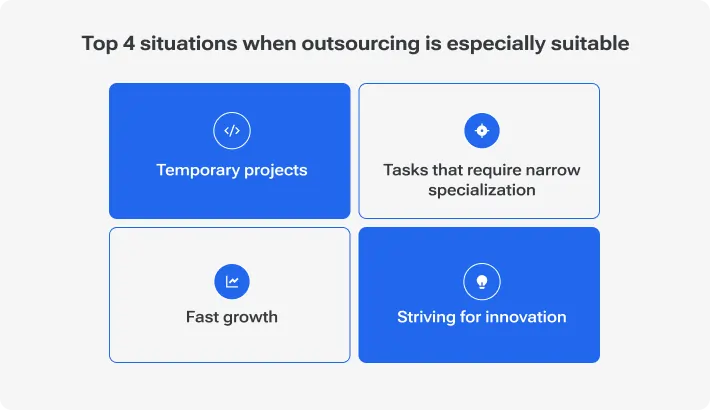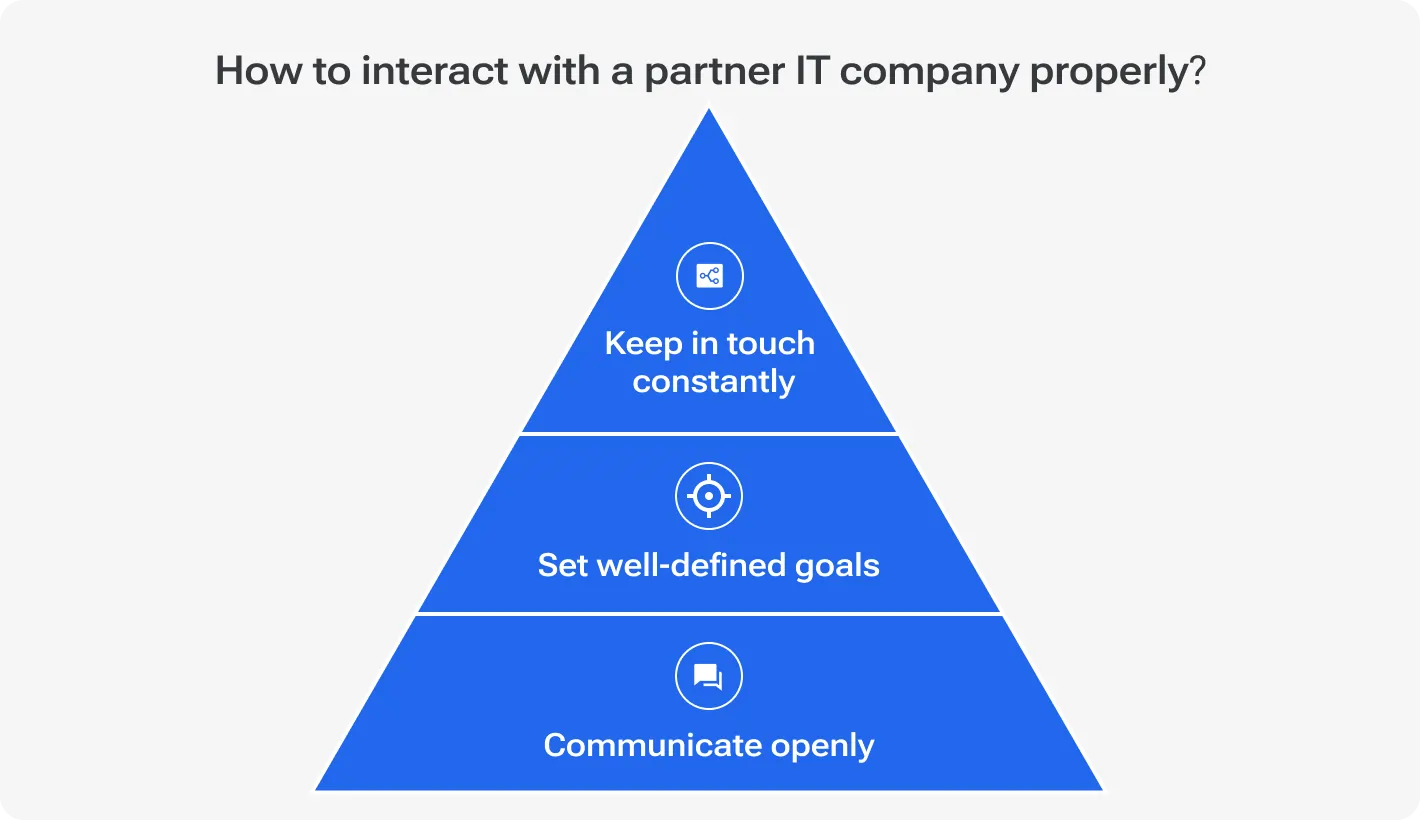Outsourcing is incredibly popular, and the demand for this work model keeps on growing steadily. 92% of G2000 companies prefer to outsource their IT tasks, and it is predicted that the global outsourcing market volume will reach $812.7 billion dollars by 2029.
This work format is so popular because outsourcing offers multiple benefits, including access to expert on demand talent. What are specialized skills in IT? How is it possible to get them with the help of outsourcing? Find out the comprehensive answer to these questions with real-life cases from this article.
End-to-end solutions with predictable budgets, a time-to-market advantage with budget savings of up to 50%
Specialized IT skills: What they are and how to get them
Sometimes it is not enough for a company to rely only on in-house experts with basic skills, such as proficiency in common programming languages, frameworks, and databases. In some cases, the business objectives of an organization require expertise in specific areas.
The types of specialized skills in IT
There are many technologies that are in great demand, but not every job seeker is proficient in them. The most sought-after specialized skills are the following:
Artificial intelligence. Many companies are turning to expert on demand services to incorporate AI into their processes and products. This technology helps automate routine tasks, which increases productivity and also reduces the risk of human error. Additionally, implementing AI/ML in products can improve the customer experience and bring a significant competitive advantage. Successful examples of using artificial intelligence in products include the personalization of recommendations on major marketplaces, such as Amazon and AliExpress.
Blockchain. This revolutionary technology is gaining stunning popularity among fintech companies. It ensures the decentralization of data storage and provides for the increased security, transparency, and immutability of transactions. This technology is so widespread that 283 million people use it globally (with 28 million in North America alone). Thus, a lot of businesses strive to implement blockchain to cater to their target audience.
Cybersecurity. The number of hackers in the world is constantly growing. In 2023 alone, 2,365 cyberattacks occurred. Therefore, it is crucial for any business, especially one that deals with sensitive customer data, such as fintech or healthcare, to rely on on demand experts in cybersecurity to protect itself from even the smallest vulnerabilities. For this purpose, organizations are seeking top cybersecurity expertise. 41% of companies plan to outsource cybersecurity, according to the survey by Kaspersky.
DevOps. It is an agile working model that provides for close contact between development and operations teams. It brings multiple benefits, such as increased productivity, faster time-to-market, and higher code quality. An impressive 99% of companies that have transitioned to this methodology notice a positive effect. Due to the high popularity and effectiveness of this work pattern, DevOps has become one of the most valuable specialized skills, often sourced through outsourcing offers.
Process automation. Many companies are striving to optimize their processes. So, they need specialists who are qualified enough to develop and implement the automation tools.
Why in-house experts struggle to cover specialized skills
Hiring in-house experts with specialized skills in the technologies listed above can involve many challenges. It can be associated with:
High costs. The average cost per hire was $4700 as of 2023. However, getting an employee with specific skills can be even more expensive. Hiring expenditures include paying for the advertisements on the job boards, subscriptions to HR services and software, and HR specialists' working hours. Also, it may be necessary to allocate some budget for external recruitment agencies if their help is needed. In addition to the cost of finding and hiring employees, it will be necessary to pay them a stable salary, bonuses, health insurance, and so on an ongoing basis in the future. These costs can be very high, as to attract top talent with specific expertise, you will likely have to offer above-average salaries or unique bonuses.
Limited availability. While there are hundreds of thousands of developers in the world, not all of them have mastered the latest technologies. Moreover, the demand for highly qualified specialists with specialized skills is constantly growing. This leads to the fact that all top professionals are already busy with their main jobs or freelance projects. So, it can be very difficult to find a free specialist open to considering a full-time job in your company.
Time constraints. The average time it takes to fill the vacancy in the IT industry is 41 days. However, when it comes to professionals with some specific expertise, it can take even much longer. Also, take into account that it will take some time for onboarding and adaptation of new employees. As a result, it may take many months before you get the skills and expertise you need to fulfill your business objectives.
So, how to overcome these challenges and get expertise on demand without excessive time spent and at a reasonable price? Of course, the best way out in such a case is outsourcing specialized skills. What are the advantages of choosing this work pattern? When is it especially suitable? You can find out the answers to these questions further in this article.
10 questions to ask your software development outsourcing vendor
5 advantages of outsourcing specialized skills
This is an extremely popular model of work. The demand for it has grown by 38% in the last 5 years (2019 to 2024). So why is it so extremely sought-after? Here are the top 5 benefits of outsourcing that make this work pattern so widespread.
5 advantages of outsourcing specialized skills for businesses
Saving costs
When you turn to outside specialists, you only pay for the volume of completed tasks you have ordered. You don't spend money on:
finding and hiring new full-time employees;
adaptation of novice team members.
paying stable monthly salaries and providing perks for them.
You can reach budget savings of up to 50% by choosing this work pattern.
Accelerating work process
Collaboration with an IT outsourcing company and its on demand experts allows you to speed up the work process considerably. The following factors contribute to this:
No need to spend time finding, hiring, and onboarding new full-time employees.
Established processes and proven automation tools that are utilized by good external IT teams.
The ability to work 24/7 in urgent cases, thanks to a multinational team with members spread across the regions in different time zones.
By turning to on demand experts through outsourcing, it is possible to significantly shorten the time to market and gain a tangible competitive advantage.
Accessing global talent
If you choose to work with an outsourced IT company, you can overcome location restraints. When you are considering only hiring full-time staff in your office, you may face significant limitations in selecting specialists with the skills you need. After all, with the office work model, the professional must be located in the city where your organization is based. On the other hand, when you opt for outsourcing, you get access to the best talent from all over the world who work effectively in a remote format.
Becoming more flexible
An in-house team of full-time experts can never give you the same flexibility as outsourcing offers, where you can scale specialized skills up or down as needed. If you are building and maintaining an internal IT team, you are limited in the skill and technology set, as well as the amount of work that can be accomplished in a given period of time.
If you need to accomplish a larger volume of tasks within a tighter deadline, this may become unreal or possible only with a significant loss of quality. Even if your workload grows gradually and steadily, you will have to constantly keep on putting in effort, as well as spending budget, and time for finding and onboarding new employees.
Outsourcing allows you to free your business from difficulties of this kind. If you cooperate with external contractors, you are not tied to a single skill set but can engage professionals with different expertise in your project as needed.
Moreover, you can easily adjust the scope of services ordered depending on the workload you have in a specific period of time. As the number of tasks grows, you can involve more specialists in the project.
If the influx of a high workload was short-term, and then you need fewer tasks to be performed, you can order fewer services. For this, you will not have to reduce in-house staff which is sometimes accompanied by negative consequences for the company's reputation.
Focusing on core business operations
Partnering with external specialists allows your in-house experts to concentrate on core competencies that drive essential business objectives. While partners perform specific tasks that require specialized knowledge and skills, your employees can focus on their core tasks that align with your overall business strategy.
When to use on demand experts: 4 situations where outsourcing works best
You have already discovered the essential outsourcing advantages. And what are the cases when this work format is especially convenient and favorable? Further in this article, you will find out the answer to this question. If your company has one of the four situations described below, this work model may be a perfect solution for you.
1. Temporary projects
Hiring full-time employees for the sake of a short-term project makes absolutely no sense. This way you may spend more time searching for, hiring, and adapting new employees than the actual work itself will last.
Besides, what to do with the employees when they have already completed the required scope of tasks? Keeping them on staff by assigning other, lighter duties to them may be too expensive, as employees with specific skills usually have higher salary expectations. Cutting staff after only a few months on the job can lead to a decline in your company's reputation as an employer.
If your initiative is a short-term or specific project, the best solution is to outsource it and bring in expert on demand support. Also, you can discuss the scope of tasks and the duration of the project before the work begins. Having ordered the necessary set of services, you can finish cooperation with partners without any problems, and, if necessary, turn to them again in the future.
2. Tasks that require narrow specialization
Some tasks may require qualifications that your in-house experts don't possess, making it smarter to bring in on demand experts for specific projects. However, recruiting new team members or upgrading the skills of existing in-house staff for the sake of a few specific tasks can be irrationally time-consuming and expensive.
In such a case, it is better to turn to external specialists with the appropriate qualifications. This way, you will get the highest quality results without spending too much extra time and budget.
3. Fast growth
Some businesses are scaling so fast that the current employees can no longer handle the ever-increasing number of tasks. Meanwhile, HR specialists do not manage to hire new team members timely.
In such a case, a partner IT company can come to the rescue. You can urgently order the completion of the tasks that your internal team can't handle. This will allow you to boost productivity, scale your business rapidly, and keep in-house experts focused on core competencies.
4. Striving for innovation
Some companies lack new ideas and the latest technologies in their products for further growth. Internal employees may already have their eyes glazed over after working on the same project for a while.
In such a case, it can be a great option to consult external experts who can look at the business with a fresh eye from a different perspective. An outsourced IT team can provide expertise on demand, suggest innovative solutions, and bring them to life if you like them.
Real-life cases for inspiration
Thousands of businesses around the world use outsourcing offers to cooperate with IT partners, tapping into specialized skills to operate and grow more efficiently. Both small, growing organizations and global market giants choose this work format. Here are some examples of success stories for your inspiration.
Mode: Getting a high blockchain expertise on demand
Mode, a crypto company from the UK decided to partner with outsourced specialists to get specialized expertise at a reasonable price shortly. The organization’s goal was to develop an innovative application for cryptocurrency earning and trading.
The professionals from the Devico IT team utilized their knowledge and skills in blockchain, cybersecurity, and regulatory compliance in the fintech industry. Their top expertise and rich experience allowed them to develop the backend of mobile crypto applications for Android and iOS from scratch, as well as a separate tool for managing data about customers and transactions.
The intensive work of the partner IT company allowed the business to get off to a successful start. In just a few years of operation, the app has already racked up more than 10 million downloads.
Unilever: One-time ordering the completion of tasks requiring specialized skills
One of the market leaders in producing and distributing goods for everyday needs decided to use new technologies to organize and optimize its business processes in 2026. Their goal was to implement integration with the enterprise resource planning (ERP) system.
In-house employees were not qualified to perform this task, and it was not rational to hire internal IT specialists just for the sake of this short-term project. Therefore, the company turned to outsourced professionals who successfully completed this task for them. And the in-house staff never had to be distracted from their main duties.
How to choose the right outsourcing partner for expert on demand services
Selecting outsourcing partners who can provide expertise on demand is the essential step on the way to success. Dealing with an unconscientious IT company can lead to improper task completion, missed deadlines, additional budget expenditures, security issues, and other problems.
On the other hand, a good outsourcing team can become your reliable partner on your business growth journey. Dedicated professionals can do their best to fulfill all your wishes, maximize alignment with your business goals, diligently meet deadlines, and stay within budget. So, how to choose the right outsourcing company, and how to interact with it correctly during your cooperation process? Find out from this article below.
Factors to consider while selecting an outsourcing partner
To choose the most suitable option, pay attention to the following points:
1. Expertise, skills, and experience. Consider whether the team has the knowledge and skills in the technologies required to accomplish your tasks. Also, consider whether the company has experience in the industry your business operates.
2. Reliability and reputation. Check reviews, testimonials, and success stories from other customers to make sure the company is trustworthy.
3. Communication practices. Research in what ways and how regularly the company usually communicates with its customers to understand if this style of communication will work for you.
4. Cultural fit. Make sure your corporate culture is compatible with that of the outsourced IT company so their on demand experts can integrate smoothly with your in-house experts. To understand this, you can book a consultation or order a test project.
5. Pricing policy. Take into account the prices of the company’s services to understand if they are within your budget. It is also advisable to choose partners who stick within the approved budget and guarantee that there are no hidden fees.
6. Customer service level. Pay attention to whether the company has customer support, how it works, and what schedule it has. Also, it is better to choose partners who are willing to support your product and provide further consultations after the main tasks have been completed.
What to look for in the outsourcing partner?
How to interact with a partner IT company properly
When you have already chosen a good and reliable partner, it is important to maintain a stable and right relationship with them to achieve the best results. Here are a few recommendations on how to do this:
Set well-defined goals. The more clearly and in detail the goals and objectives are described, the better the outcome of the work will be. Describe the goals clearly and unambiguously, provide specific metrics by which you will measure them, and set deadlines.
Communicate openly. Avoid reticence, provide partners with as much relevant information about your business as possible, and don't be afraid to provide fair feedback on the intermediate work results.
Keep in touch constantly. Don't drop out of communication for a long time, so that misalignment doesn't occur. Establish a tradition of regular meetings and reports to keep on the same page and monitor the workflow all the time.
Final thoughts
With outsourcing, you can get expertise on demand in specific areas like AI, blockchain, cybersecurity, DevOps, or process automation, without overburdening your in-house experts. Many companies are pursuing this option due to its benefits, such as:
instant access to global talent;
gaining the flexibility to scale;
freeing up internal staff for core business tasks.
And in some cases, it is the only best solution at all. For example, in such situations as:
specific tasks for which the internal team lacks the skills;
the desire to scale a project faster and bring new ideas to it.
Do you want to experience all the benefits of outsourcing? Or are the situations described above about your company? Get in touch with us and take the first step in empowering your business with external professionals’ specialized expertise.
Support your business growth with a global talent pool of experienced software engineers






